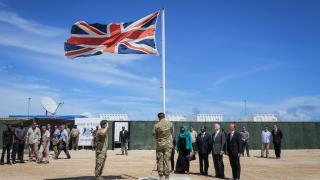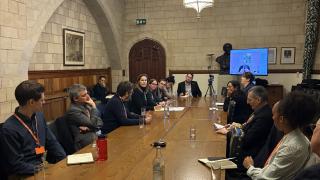
On Wednesday 26 February, the UK Government published further details about the planned Integrated Review, billed by the Prime Minister as “the largest review of the UK’s foreign, defence, security and development policy since the end of the Cold War”.
The Review is intended to cover all aspects of the UK’s place in the world, from the role of the UK’s diplomatic service and approach to development to the capabilities of our Armed Forces and security agencies. The Review will be led by the Cabinet Office, and will take place alongside the Comprehensive Spending Review (expected to be completed by Autumn).
In recent years UNA-UK has been increasingly concerned that UK foreign policy was being underpinned by an out of date national security strategy. We raised this in our 2019 election resource pack, point five of which calls for a national security review.
The current strategy was published in 2015 when the global security environment, as well as the UK’s own arrangements within Europe, were very different. We therefore welcome the UK’s intention to conduct a thorough review.
The Government's press release stated that it intends to “utilise expertise from both inside and outside government for the review, ensuring the UK’s best foreign policy minds are feeding into its conclusions”.
UNA-UK welcomes this statement in principle and hopes to be given a formal opportunity to submit our policy research into the Review. We also hope to facilitate the feed-in of our nationwide-grassroots supporter-base, much like we did in the 2015 National Security Strategy and Strategic Defence and Security Review (NSS/SDSR).
However, we have many questions around the modality of the external consultation that the UK may be planning.
UNA-UK played a major role in the public consultation during the run up to the 2015 NSS/SDSR (submissions from UNA-UK and its nationwide grassroots supporters represented 10% of the total). In light of our subsequent work and that of partner organisations such as Rethinking Security, we feel there are lessons this consultation, and the Review more broadly, should learn from previous efforts.
Our suggestions include but are not limited to the following:
- The consultation should be public and be open to all (rather than an exclusive group of Government-identified “best minds”)
- Citizens’ assemblies and other representative feed-in mechanisms should be considered to ensure marginalized communities are included in the process
- It should be launched with sufficient time for the inputs to be given meaningful consideration by those drafting the document
- The consultation should be transparent and accountable with clarity over how submissions from the public are used
- The Government should spearhead a national conversation to raise awareness for the consultation and foster a nationwide debate around the major threats facing the UK
- The consultation must address the disconnect that can arise where Government actions do not live up to the commitments made on paper in national security doctrines. It should examine how the UK’s own conduct has run counter to the 2015 NSS/SDSR, for example when it comes to examining the erosion of the rules-based international system
- Domestic actions can have an equal, and sometimes greater, effect on the perceptions that underpin Britain’s diplomatic weight. The Review announcement emphasises foreign policy, but the Review itself should have a cross-governmental scope and incorporate (for example) the Home Office, Department of Justice, Department of Education, Department of Health, as well as outward-facing departments
- The outcome of the Review should command cross-party support and so the consultation should involve Parliamentary Select Committees as a key partner, and include the views of parliamentarians from all parties and both Houses
- The Review should challenge outdated presumptions about security including the narrow, often militaristic, definitions used by the UK (and many other states). It should consider the adoption of a more modern, holistic “whole-of-society” lens. Rethinking Security’s comparative study of 20 nations’ security strategies shows that there are viable alternatives to the UK’s approach
- Rather than the light-touch, and incompletely implemented, annual reporting and rebranding exercises we saw following the 2015 NSS/SDSR, the Review should consider regular opportunities to strengthen the document more frequently. This should include opportunities for public reflection and appraisal of the UK’s performance against the agreed-upon strategy
The 2015 NSS/SDSR identified the need to “strengthen the rules-based international order and its institutions” as a key priority, yet over the past five years we have seen the international system under attack and the fundamental idea of multilateralism questioned by political movements and heads of state, including close allies.
Throughout this Integrated Review UNA-UK will highlight the extent to which effective international institutions like the United Nations and global cooperation more broadly underpin British security and prosperity.
UNA-UK will be writing to the Prime Minister to offer our assistance with the Review and to convey our learning points from previous security reviews.
For more details on the Review and UNA-UK’s parliamentary input, see the following resources:
- Click here for our commentary on the 2015 NSS SDSR
- Click here for our evidence to the parliamentary inquiry on NSS SDSR
- Click here for Rethinking Security’s comparative study
- Click here for our election resources
- Click here for the UNA-UK Global Britain Scorecard
- Click here for an overview of our parliamentary input
- Click here for our work to reform UK UN Peacekeeping Policy
- Click here to read our Keeping Britain Global report
Photo: Opening of the New British Embassy in Mogadishu, 2013. Credit: UN Photo / Stuart Price






